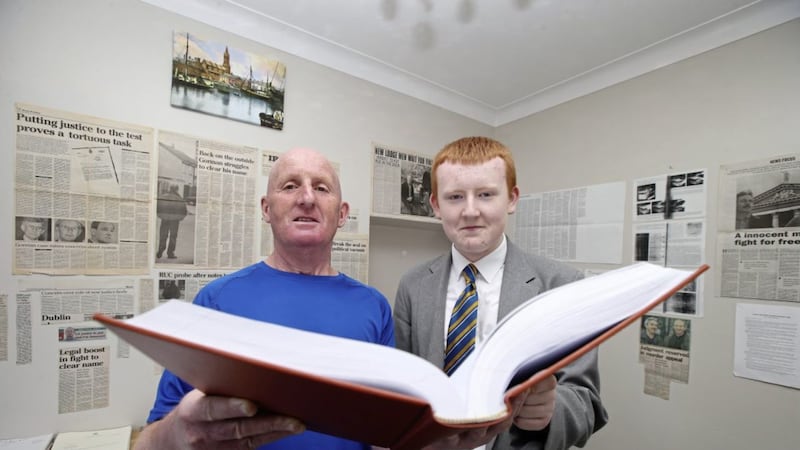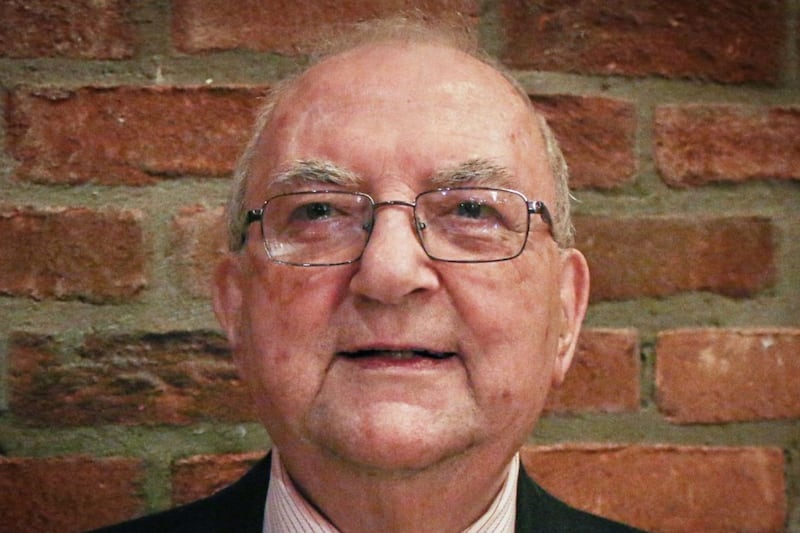RETIRED Judge John Curran, who was buried on Tuesday, died without ever again meeting the man whose innocence he secured with an unprecedented court manoeuvre during the Troubles.
Billy Gorman was accused of murdering a policeman in 1974 when he was aged just 14.
John Curran QC was his defence lawyer at his 1979 Diplock trial and fought passionately for his acquittal.
Mr Gorman was charged with the murder of RUC Constable Thomas Ian McClinton along with his co-accused Paddy McKinney, who was 17 years old at the time of the murder.
The young father-of-one was checking cars for bomb on Upper Donegall Street in Belfast city centre when his killers approached from behind and fired four times into his head and chest.
One witness thought the killer was wearing a school blazer, and the case became known as the schoolboy murder - although at the trial a ballistics expert would state they believed it was a professional killing.
The young men were arrested five years later and taken to Castlereagh interrogation centre, where the RUC alleged that they made a confession after three days of interrogation.
"Many times he went out of his way to try and explain to me what was happening," said Mr Gorman, who contacted The Irish News after reading of Judge Curran's death.
"That trial was supposed to take a week - all those trials were a week or 10 days - but it went on for 32 days because the man wouldn't sit down.
"He kept at them and kept at them until there was nowhere else to go."
Both were found guilty at Belfast Crown Court, Mr Gorman was sentenced by Mr Justice Maurice Gibson as a juvenile, eventually serving 14 years behind bars.
However, while the barrister accepted the verdict he did not accept defeat after their conviction.
As the judge began passing sentence the QC rose to his feet and "calmly" told him he was making a grave mistake, insisting they be returned to the dock to allow them to re-affirm their innocence.
It is understood there was no British judicial precedent for such request and it led to a heated legal argument between Mr Curran, the judge and prosecution, with the barrister remaining on his feet for over an hour making his case.
Mr Justice Gibson finally allowed Mr Gorman to re-enter the witness box and swear his innocence on a Bible.
"I believe to this day that what he did sent the judge into a tirade, because he couldn't sentence me the way he wanted to," Mr Gorman said.
"He called me `callous', when there were grown men he convicted who he was saying he could `tell you've gone down a wrong path'.
"He was enraged at what John had done. People in legal circles have told me that."
Mr Curran also requested all interview records be placed in the secure court archives, believing their convictions would one day be questioned and determined they would be available.
"He effectively refused to let the judge pass sentence until he would put those safeguards in place.
"It was a great thing he did. No-one else had been called back into the witness box after being found guilty.
"Other people went to try and get their convictions overturned but the papers had been destroyed."
When the case was sent back to the Northern Ireland Appeal Court in 1999, Mr Gorman's legal team - which included Arthur Harvey QC, who had been Judge Curran's junior in the original case - asked for the confessions to undergo a forensic electrostatic deposition analysis which proved they had been extensively rewritten.
Mr Gorman said: "He just wouldn't give up and we would never have been able to challenge our conviction without what he did.
"I never met him again after I went to prison, but I will never forget him."
Judge Curran, who died peacefully at his Moira home, went on to be appointed to a County Court judge in 1981, acting as Recorder of Derry from 1982 to 1985 before being assigned to Craigavon.
"He was always regarded as a very, very fair judge," Mr Gorman said.
"After that attack on John's house [in 1987 a bomb was thrown and shots were fired from a car passing his Belfast home, leaving a broken window but no injuries] the IRA released a statement saying it wasn't on John, it was on the two policemen - his bodyguards."
Mr Gorman has written a book about his own fight for justice which he has had bound and given to his son Cormac.
"I wanted to give it to him for his 14th birthday - the age I was."
Judge Curran's family and friends paid their last respects at Requiem Mass in St Patrick and St Ronan’s Church, Magheralin.




